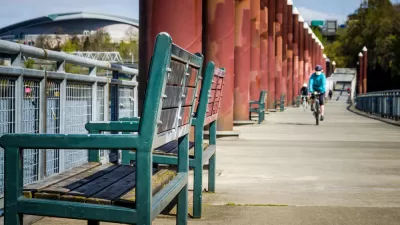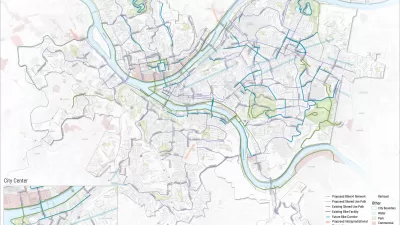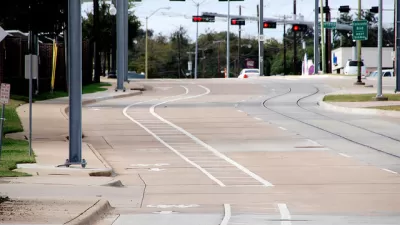New research ties pop up bike lanes implemented in Europe during the pandemic to increased levels of biking.

Veronica Penney shares the news: "Adding bike lanes to urban streets can increase the number of cyclists across an entire city, not just on the streets with new bike lanes, according to a new study."
"The finding adds to a growing body of research indicating that investments in cycling infrastructure can encourage more people to commute by bike," adds Penney.
The study, authored by Sebastian Kraus and Nicolas Koch and published in April by the Proceedings of the National Academy of Sciences of the United States of America, quantifies its findings thusly: "in cities where bike infrastructure was added, cycling had increased up to 48 percent more than in cities that did not add bike lanes."
The effect varies depending on the density of development and public transit. Denser, transit-oriented cities saw larger increases. "Paris, which implemented its bike lane program early and had the largest pop-up bike lane program of any of the cities in the study, had one of the largest increases in riders," according to Penney's explanation fo the study.
The article includes more details on the study's findings, as well as an explanation of the study's methodology. Penney also connects the study' findings to bike mobility as a tool in the effort to reduce greenhouse gas emissions.
While the study focused on Europe, it's worth noting that the city of Bogotá, Colombia, also the originator of Ciclovía, was the first to temporarily expand bike infrastructure in the name of public health during the pandemic, opening 76 km (47 miles) of temporary bike lanes to reduce crowding on public transport in early March. The actions of Bogotá to increase bike infrastructure were one of the clearest, early signs of the many ways the public health responses of the pandemic would interest with issues of planning.
FULL STORY: If You Build It, They Will Bike: Pop-Up Lanes Increased Cycling During Pandemic

Trump Administration Could Effectively End Housing Voucher Program
Federal officials are eyeing major cuts to the Section 8 program that helps millions of low-income households pay rent.

Planetizen Federal Action Tracker
A weekly monitor of how Trump’s orders and actions are impacting planners and planning in America.

Ken Jennings Launches Transit Web Series
The Jeopardy champ wants you to ride public transit.

Opinion: Transit Agencies Must View Service Cuts as Last Resort
Reducing service could cripple transit systems by pushing more riders to consider car ownership, making future recovery even less certain.

‘Smart Surfaces’ Policy Guide Offers Advice for Building and Maintaining Urban Tree Canopies
Healthy, robust tree canopies can reduce the impacts of extreme heat and improve air quality.

New Jersey Lawsuit Targets Rent-Setting Algorithms
The state of New Jersey is taking legal action against landlords and companies that engage in what the state’s Attorney General alleges is illegal rent fixing.
Urban Design for Planners 1: Software Tools
This six-course series explores essential urban design concepts using open source software and equips planners with the tools they need to participate fully in the urban design process.
Planning for Universal Design
Learn the tools for implementing Universal Design in planning regulations.
Heyer Gruel & Associates PA
Ada County Highway District
Institute for Housing and Urban Development Studies (IHS)
City of Grandview
Harvard GSD Executive Education
Toledo-Lucas County Plan Commissions
Salt Lake City
NYU Wagner Graduate School of Public Service





























